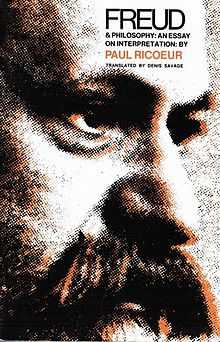Freud and Philosophy
| Freud and Philosophy: An Essay on Interpretation | |
|---|---|
 The 1970 Yale University Press edition | |
| Author | Paul Ricœur |
| Original title | De l'interprétation. Essai sur Sigmund Freud |
| Translator | Denis Savage |
| Country | France |
| Language | French |
| Subject |
Philosophy Psychoanalysis |
| Published |
|
| Media type | |
| Pages | 573 |
| ISBN | ISBN 0-300-02189-5 (Yale edition) |
Freud and Philosophy: An Essay on Interpretation (French: De l'interprétation. Essai sur Sigmund Freud) is a 1965 book about Sigmund Freud by Paul Ricœur.
Outline
Ricœur argues that psychoanalysis is not a science but a language, a "semantics of desire." He seeks to bring Freud's ideas into conformity with the linguistic turn - the "effort to understand virtually all aspects of human behavior in terms of language."[1]
For Ricœur, all interpretation partakes of a double hermeneutic. Psychoanalysis involves an "archaeology" of meanings, motives and desires, an attempt to delve into the unconscious layers of repressed or sublimated memory. Yet it also points a way through and beyond that condition by offering the patient renewed possibilities of self-knowledge and creative fulfillment.[2]
Influence
Ricœur's work has been grouped with Herbert Marcuse's Eros and Civilization (1955), Norman O. Brown's Life Against Death (1959), Philip Rieff's Freud: The Mind of the Moralist (1959), and Jürgen Habermas's Knowledge and Human Interests (1968), books which jointly placed Sigmund Freud at the center of moral and philosophical inquiry.[3] Freud and Philosophy has been called the locus classicus of the "portrait of Freud as a hermeneutician and philosopher - a figure on the model not of Darwin but of Nietzsche", which has "dominated the largely literary and philosophical representations of Freud in recent scholarship."[4]
Psychoanalyst Joel Kovel sees Freud and Philosophy as an important demonstration that Freud was a post-Hegelian thinker, though he notes that Freud himself would have rejected any association with Georg Wilhelm Friedrich Hegel.[5]
See also
|
|
References
Footnotes
Bibliography
- Books
- Abramson, Jeffrey B. (1986). Liberation and Its Limits: The Moral and Political Thought of Freud. Boston: Beacon Press. ISBN 0-8070-2913-0.
- Kovel, Joel (1991). History and Spirit: An Inquiry into the Philosophy of Liberation. Boston: Beacon Press. ISBN 0-8070-2916-5.
- Norris, Christopher (2005). Honderich, Ted, ed. The Oxford Companion to Philosophy. Oxford: Oxford University Press. ISBN 0-19-926479-1.
- Robinson, Paul (1993). Freud and His Critics. Berkeley: University of California Press. ISBN 0-520-08029-7.